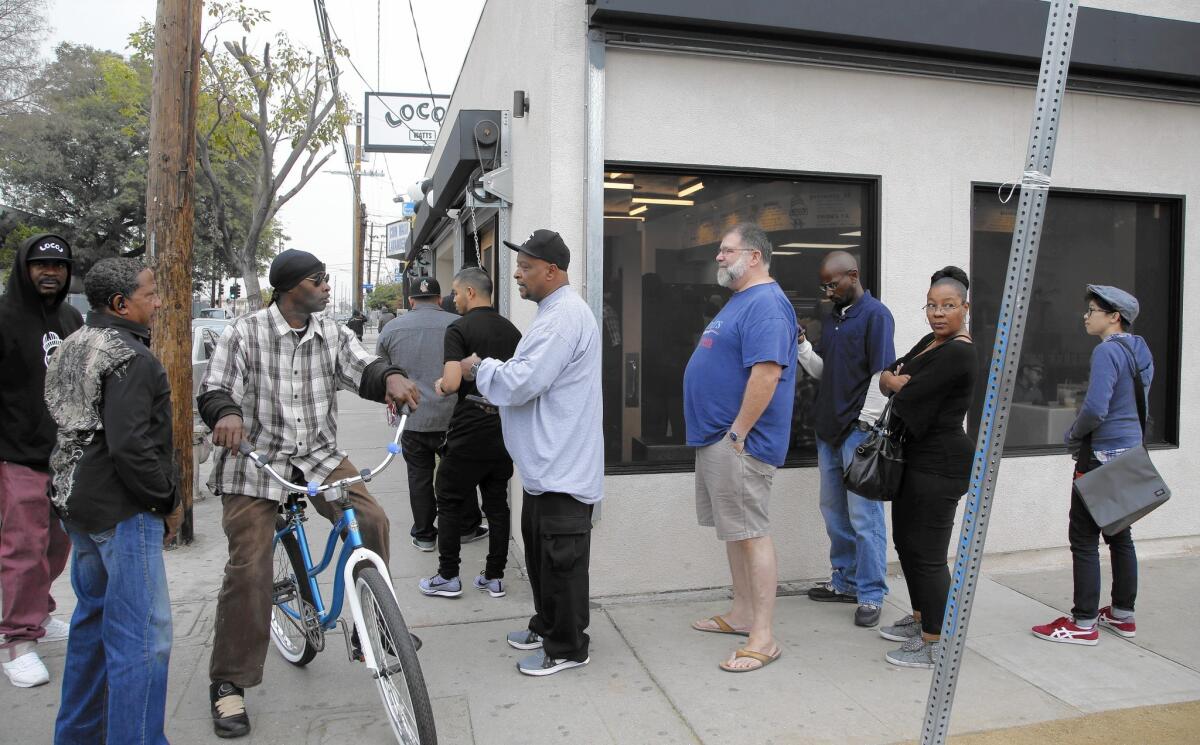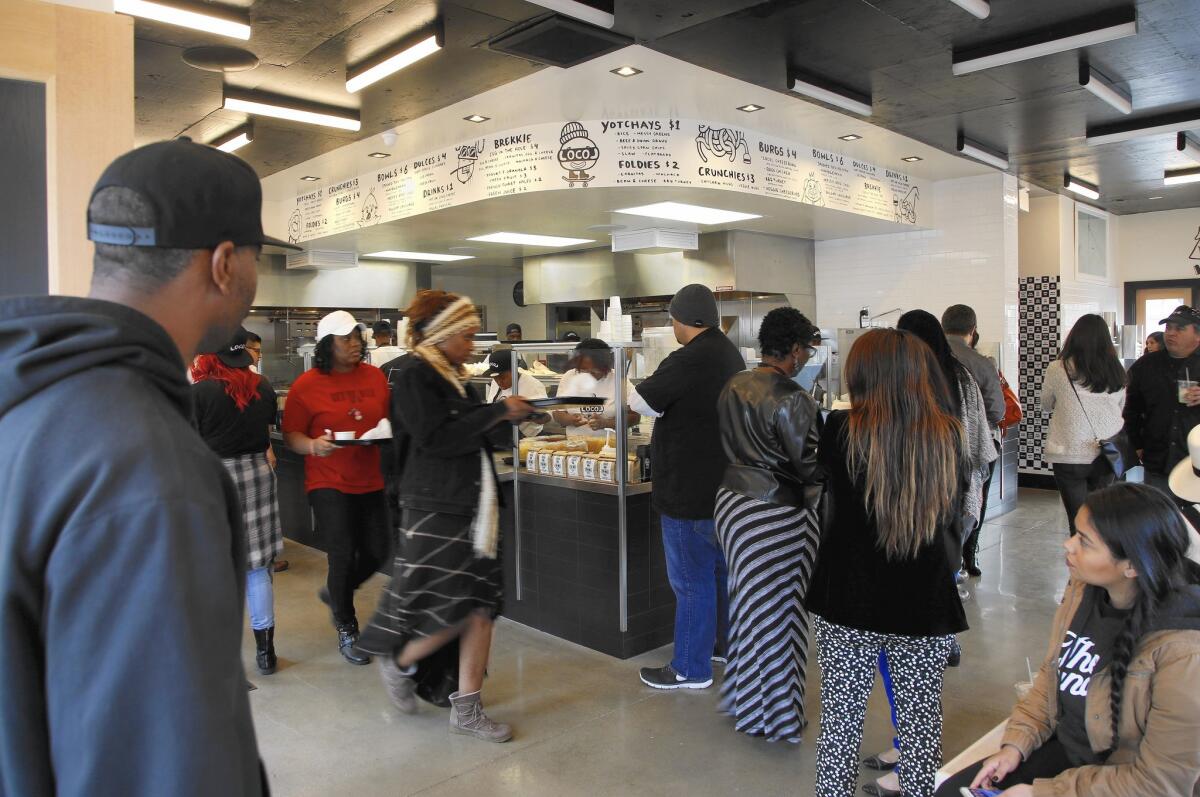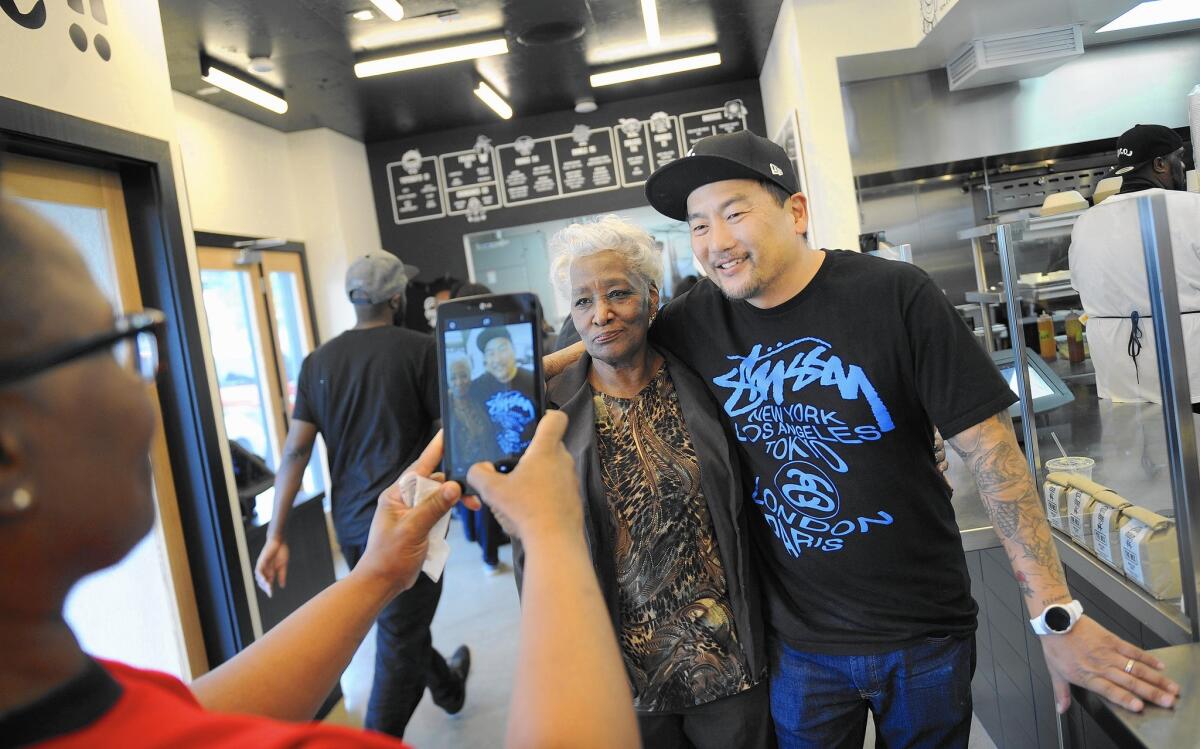Roy Choi and Daniel Patterson try to start a healthful fast-food revolution in Watts with Locol

- Share via
As you crawl down 103rd Street looking for a parking space, tooling past the Jordan Downs projects and the Florence Griffith Joyner Elementary School, it is not hard to spot Locol, the new quick-serve restaurant that is trying to transform Watts one spicy noodle bowl at a time. There’s the line, for one thing, spilling out of the door and trickling down Anzac Avenue, and the jaunty sign, and the people hollering to their friends through the screened windows of the lanai-like structure.
The chairs and tables on the patio look more like children’s building blocks than they do like proper furniture, which is hard to understand until you see the customers tug them into a hundred different configurations. And you have never seen such hugging outside of a big family picnic. On a weekday afternoon in Watts, Locol is clearly the place to be.
For the record:
12:33 p.m. Jan. 23, 2016A previous version of this article about the new restaurant Locol in Watts said its coffee comes from the roasters at Blue Bottle. The coffee comes from a collaboration between Locol and Tony Konecny.
Watts is at the center of what is sometimes called a food desert, which the USDA defines as “a census tract where a substantial number or share of residents has low access to a supermarket or large grocery store.” Locol isn’t in an area completely devoid of options — there are a couple of small markets, a Chinese takeout place, an outlet of Louisiana Fried Chicken and the excellent wings and grits breakfasts at the Watts Coffee House within a block or two — but there is nothing like a supermarket within Watts proper, and it is much easier to grab a pack of Top Ramen at the convenience store than it is to prepare or find a proper meal.
With Locol, chefs Roy Choi, whose Kogi truck and Korean hot-pot place Pot regularly make it onto The Times’ list of L.A.’s 101 best restaurants, and Daniel Patterson, whose San Francisco restaurant Coi holds two Michelin stars, aim to do nothing less than revolutionize the system of fast food in America, to bring delicious, nourishing food into the areas that need it most.
At the 2013 MAD conference in Copenhagen, Choi electrified an audience of chefs with a talk about hunger and civic responsibility, which he illustrated with slides of underserved communities in Los Angeles. Chefs were at a moment of unprecedented celebrity, said Choi, and it was time to use some of that influence to change the culture; to make sure that everyone in those communities had access to food as healthful and delicious as what they were serving their relatively affluent customers. Perhaps, he suggested, they could persuade investors interested in their restaurants to also help them open food venues in less-glamorous parts of town.
Patterson had been in that Copenhagen audience and introduced himself to Choi. At the 2014 MAD conference, he and Choi announced their idea for Locol: a chain of restaurants with a loose skate park feel, serving fresh, healthful cooking for about the price of a drive-thru meal — not a replacement for fast food, but a better version of it.

A year and a half later, I find myself in line at Locol, on a street more famous for having burned in the 1965 riots than for anything rebuilt on it since. The day before, for the grand opening on Martin Luther King Day, the line had stretched all the way down a long block, Mayor Eric Garcetti showed up, and Choi had his DJ play King’s “I Have a Dream” speech before ex-football star Jim Brown cut the ribbon and declared the restaurant open. People waited patiently for nearly two hours for a shot at the chili bowls and the fried chicken sandwiches, the flat bean-filled tacos called “foldies” and the cupfuls of stewed collard greens.
The day after the opening, Patterson took a brief rest from cooking out on the restaurant’s patio and marveled at the 2,000 or so people who had showed up the day before. “Today is just ordinarily crazy. And I think we’ve got the food to the point where it’s … OK. But that’s not necessarily the most important thing, at least not right now. The important thing is that we’re here.”
He and Choi are kind of an odd pairing — the modernist haute cuisine guy and the food truck czar; one driven by technique and the other by an almost supernatural ability to feed huge numbers of people. Patterson stepped down as chef at Coi last month, partly to help oversee the development of Locol. (A second Locol, in Oakland, is set to open soon, followed by a third in San Francisco’s Tenderloin district and a fourth in Los Angeles, also in Watts.) But the team seems to work.
This is a key moment for chefs attempting to change the morality of the food chain. Massimo Bottura, perhaps the most influential chef in Italy at the moment, ran a soup kitchen for the homeless at the World’s Fair in Milan last summer. Brooks Headley quit his job as pastry chef at New York’s revered Del Posto to open the vegan fast-food stand Superiority Burger. Dan Barber of Blue Hill in New York organizes events battling food waste, Jose Andres of Bazaar is involved with food initiatives in Africa and Haiti, and Michael Cimarusti of Hollywood’s Providence launched a sustainable dock-to-dish program in Southern California. But perhaps none of the projects is quite so ambitious as Locol, which is making a stand against some of the most entrenched pockets of urban hunger in the U.S.
Watts is now home to a different kind of meal. There is a new vocabulary for the food at Locol. Sandwiches are “burgs,” served on soft, griddled buns developed by Chad Robertson of the famous San Francisco bakery Tartine. Tacos are “foldies,” stuffed with carnitas, spicy barbecued turkey or cheese and nicely stewed beans. Side dishes are “yotchays,” an abstraction of the Korean word for vegetables, and include things like coleslaw, rice, hot flatbread and greens. The coffee is roasted in collaboration with Tony Konecny, founder of Tonx.
“You’ve got to try the Watts Special,” Choi tells a customer. “Flatbread and oniony beef gravy. You’ll love it, and it costs just two bucks.”

I finally make my way to the front of the line, order, and find myself a cube to sit on outside.
“This is overwhelming,” Choi says. “An out-of-body experience. There was a similar sensation with the first few months of Kogi, like the first time we showed up in a Rosemead parking lot to find 600 people waiting for us, but in some ways this is more complex and profound, almost to the point of tears. Strangers are hugging; kids are running around happy.... In this neighborhood, in Jordan Downs, there’s not just a lack of markets and places to go, there’s a persistent institutional design, dreary furniture — it’s just bleak. Good design is important. And the energy of Watts, this specific neighborhood, is on the block.”
I stab my fork into a bowl of salad and am stunned by the vivid tarragon flavor of the dressing.
“Our people, the people who work for us here, trust us, because we are constantly trying to fulfill the promises we make,” Choi says. “They trusted us on the food.... Everybody who works here is from the immediate neighborhood. And we found our people the old-fashioned way — we posted help-wanted fliers on telephone poles. Around here, word of mouth is faster than the Internet.
“And the friends and family meals were great. We had deep OG Grape Street guys and wealthy potential investors from New York all eating the same food and talking about the same thing; same context, same vocabulary.”
Did the food have to adapt to the neighborhood?
“We thought we had the menu set,” Choi says. “But when we talked to the kitchen guys about it, our people were looking at us like something was missing, like we had stopped before we had finished. Finally somebody said, ‘Where’s the turkey?’”
Turkey, wholesome, full-flavored and relatively low in calories, is a staple of the modern African American table.
“So we developed a new dish — a smoky, spicy Turkey Burg, like a spicy barbecued turkey sandwich,” Choi says. “And it looks as if it might be our bestseller.”
More to Read
Eat your way across L.A.
Get our weekly Tasting Notes newsletter for reviews, news and more.
You may occasionally receive promotional content from the Los Angeles Times.











